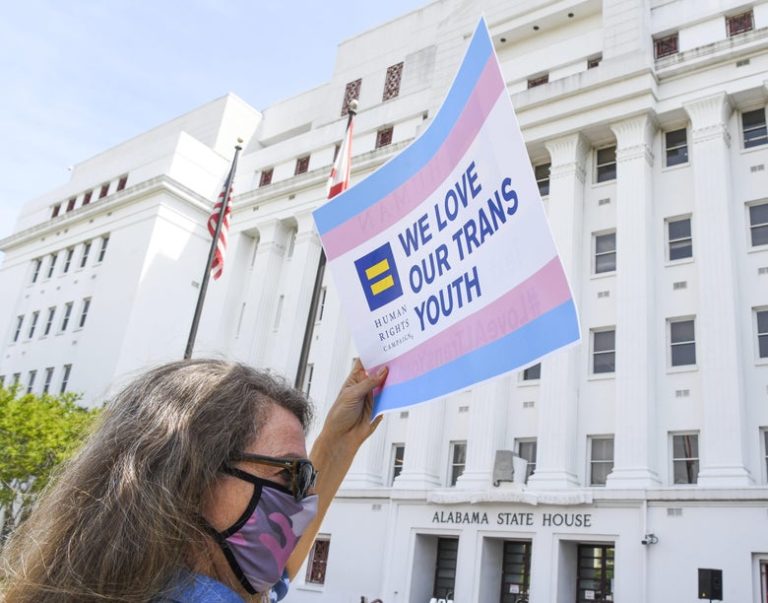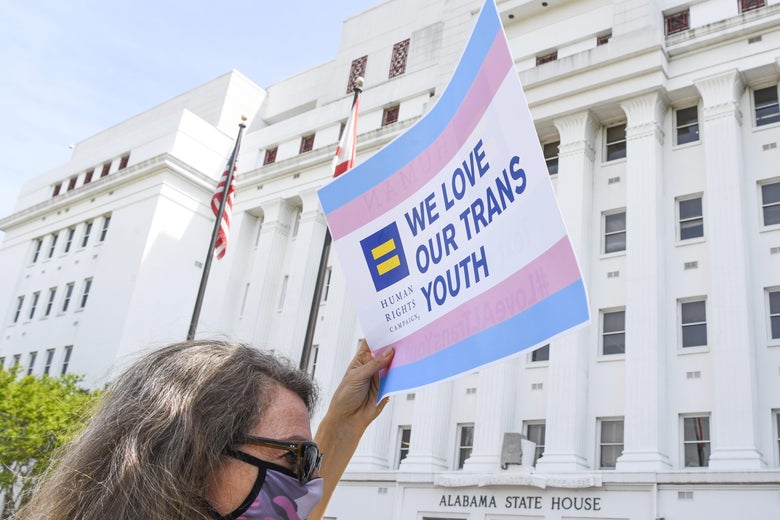

On Monday, three Republican state senators in North Carolina introduced the Youth Health Protection Act, a perverse title for a bill that imperils youth health. The measure would prohibit all gender-affirming health care for children and adults under the age of 21. It also requires all “government agents,” including school officials, to report a child’s “gender dysphoria” or “gender nonconformity” to their parents—effectively requiring schools to out LGBTQ students. By Wednesday, the act had drawn four additional Republican cosponsors, meaning a full quarter of the North Carolina Senate’s Republican caucus is now sponsoring it.
Advertisement
The Youth Health Protection Act is the latest in a spate of anti-trans bills that have emerged in state legislatures over the last few months, all of which seek to wield the machinery of the government to impose rigid gender norms, with severe penalties for all who dare defy them. The bills all closely resemble one another, which should not be not surprising since many of them were ghostwritten by the same organization, the Alliance Defending Freedom, which has spent years combatting both reproductive rights and gay equality, including birth control access and the legalization of homosexuality. The Youth Health Protection Act is the logical outgrowth of this ideology, but it is not, by any stretch, its endpoint.
Advertisement
Advertisement
Over the last 28 years, the ADF has defended laws prohibiting same-sex intimacy; opposed marriage, adoption, and surrogacy for same-sex couples; attacked LGBTQ non-discrimination laws, as well as bans on conversion therapy for minors; argued in favor of laws that require transgender people to undergo sterilization before legally changing their gender; challenged access to contraception; and supported the criminalization of abortion at any stage of pregnancy. Its work stretches beyond the United States; ADF has, for instance, championed Belize’s archaic anti-sodomy law, which allows for the persecution and imprisonment of gay people. The ADF’s overarching position on gay people is that they should either be converted to heterosexuality or fired from their jobs and imprisoned because of their sexual orientation. This stance has earned the group a controversial designation as a hate group by the Southern Poverty Law Center.
Advertisement
When GOP state legislators began to push “bathroom bills” in 2016 and 2017, it was ADF that ghostwrote the model legislation and lobbied for it behind the scenes. These bills forced transgender people, including schoolchildren, to use the bathroom that aligned with their “biological sex,” which ADF defined as their sex identified at birth. One school attempting to implement an ADF-style bathroom policy sought to make trans students wear a bright green wristband so that school administrators could identify them and ensure they did not use the bathroom that corresponded to their gender identity. (A federal appeals court found the school policy unconstitutional, and the school district settled for the case for $800,000.)
Advertisement
As these bills illustrate, ADF has long viewed public schools as an ideal testing ground for their ideas, and it’s easy to see why: The government exercises direct control over students—and their bodies—for hours each day. ADF has a clear vision of how these students should act, and how their bodies should look, and it tried to conscript schools to enforce that vision. It was no surprise when, plainly inspired by ADF’s bills, Virginia Del. Bob Marshall sponsored a measure in 2017 that forced schools to notify parents within 24 hours if their child indicates that they are transgender. (In the next year’s election, Danica Roem, a transgender woman, defeated Marshall.) The idea behind the Youth Health Protection Act’s parental can be traced back to the now-ubiquitous laws requiring minors to obtain parental consent before terminating a pregnancy, which ADF also strongly supports.
Advertisement
Most of the bathroom bills never actually passed, although plenty of school districts implemented them at the local level, and North Carolina modified its notorious measure after nationwide backlash. These laws were never especially popular, probably because there is no obvious “victim” when a transgender person uses the appropriate bathroom, and thus no apparent problem in need of a solution. They were rooted in fear of the “bathroom predator,” a mythical figure who pretends to be female so he can gain access to women’s bathrooms and rape them.
Advertisement
ADF’s crusade against trans athletes has no basis in reality or science.
But the bathroom predator does not exist. So ADF developed a second generation of anti-transgender legislation, this time identifying an ostensible problem and a victim. The problem: transgender girls and women participating in sports, particularly school athletics. The victim: every cisgender girl and woman forced to compete against trans athletes. The solution: new model legislation drafted and pushed by ADF banning transgender students from participating in women’s sports, from elementary school through college.
Advertisement
In reality, this putative problem does not exist. There is simply no evidence that transgender women are dominating student sports and denying cisgender women the benefits that come with athletic excellence, like scholarships. Many states, including California, have long allowed trans athletes to participate alongside cisgender girls, and their policies have not diminished cisgender students’ ability to compete and win. ADF’s crusade against trans athletes has no basis in reality or science. Major athletic bodies, including the NCAA, oppose them.
Yet Republican-controlled legislatures are racing to pass bills drafted by ADF that forbid transgender students from competing in women’s sports, framing trans athletes as cheaters who use fraudulent womanhood to invade and dominate women’s spaces. Idaho passed such a bill in 2020; it allowed anyone to challenge the gender of a female athlete, forcing her to undergo sex verification including, in some cases, a genital exam. (A court blocked the measure.) Mississippi passed a ban on transgender athletes in in March alongside Arkansas and Tennessee. Then, on Tuesday, the Arkansas legislature overrode the Republican governor’s veto to pass a bill outlawing gender-affirming care for minors.
Advertisement
North Carolina’s Youth Health Protection Act takes the principles embodied in previous ADF-approved anti-trans laws a few steps further. Under the bill, it’s not just minors who cannot access gender-affirming care, but also adults aged 18-20. Schools are not only required to discriminate against transgender students, but also to out them to their parents. Schools must also inform parents if their children are gay, bisexual, and nonbinary students, since these identities also qualify as “gender nonconformity.” Several other provisions of the law check other boxes on ADF’s wishlist, including a ban on government-sponsored health insurance coverage for gender transition. (This section violates the Affordable Care Act; the rest of the law clashes with the equal protection clause, as does every piece of legislation mentioned above, although it’s difficult to predict this Supreme Court’s direction on transgender equality.)
Advertisement
If the Youth Health Protection Act passes out of the legislature, North Carolina’s Democratic governor will undoubtedly veto it. But these anti-LGBTQ bills build on each other. Soon, another state will consider outlawing gender-affirming care not just for youth or young adults, but for everyone. Schools will introduce harsher and harsher policies designed to identify and discriminate against students who do not perfectly match a cramped conception of gender roles. The government will insinuate itself into parents’ relationship with their children, children’s relationships with their bodies, and LGBTQ adults’ attempts to live authentic and fulfilling lives. ADF’s ascendant ideology demands nothing less. Did anyone really think this was going to stop with bathrooms?
Slate is covering the stories that matter to you. Become a Slate Plus member to support our work. Your first month is only $1.